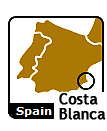Travel & Holiday Advice
CHEAP FLIGHTS
We have listed Links to airlines that fly from your nearest airport to the Costa Blanca and where to get the best deal on cheap flights.... Info>>
LOCAL CAR HIRE
We can recommend a reliable local company that provides a good service, and you can collect/return from the airport... Info>> or well-known
DRIVING
If you are thinking of driving down, a scenic drive through France and Northern Spain, either by direct motorways or toll-free national roads, brings you to our part of Spain.... Info>>
TRAVEL INSURANCE
If you don't currently have travel insurance to cover your holiday, a booking requirement (point 26) of our Terms & Conditions), then we can suggest a single trip cover, or annual multi trip (unlimited travel for the whole year - the more you travel the more you save!) .... Info>>
AIRPORT PARKING
If you are looking for good-value parking at the airport then compare the prices.... Info>>
AIRPORT HOTELS
If you have an early flight to catch, in the UK, then have you considered staying at a hotel near the airport the previous night? .... Info>>
Or, if you have a late arrival at the airport in Spain then you can stay at a nearby hotel for as little as 39 Euros for a room: go direct to their website & book on-line - ETAP>> or HOLIDAY INN 'EXPRESS'>> or IBIS>>
AIRPORT LOUNGES
They're not just for business class passengers. Relax in first class comfort and escape the hustle and bustle of the airport for up to 3 hours before your flight. All drinks and snacks are included.... Info>>
FERRIES
Fast crossings between Dover and Calais, and other crossings such as Portsmouth to Bilbao in Spain.
AIRPORT TRANSFERS
Once there, if you don't want to drive then consider the following transfers to your accommodation.... Taxi>> for upto 4 persons - Self-drive Minibus>> upto 9 - SHUTTLEDIRECT>> coach transfer
TRAVEL BY RAIL
Try the following companies to plan your rail journey to Spain - RAIL EUROPE>> or THE TRAINLINE>> or INTERNATIONAL RAIL>>
ADDITIONAL INFORMATION
Links to other organisations that will compliment your travel.... RAC breakdown cover>> - POST OFFICE>>
Travel Insurance, Credit cards and Cash
Holiday Travel Insurance - It is adviseable to purchase holiday travel insurance before you leave. You are particularly vulnerable when you go abroad and, sooner or later, you will probably need to claim. Take your policy documents with you so you know exactly what to do. Some people lose out because, for instance, they do not report details of a theft to the local police within a day of the crime.
Consider annual travel cover if you go away two or three times a year. Insurance bought through a travel agent is usually very expensive. it's best avoided, particularly if you have time to buy cover on the internet or from a broker or bank.
Look at the policy exclusions and make sure you declare any medical conditions you have. People suffering from asthma, for example, may be unable to claim if they do not declare the problem beforehand. Info>> or AA Travel Insurance>>
The E111 is replaced by the EHIC
The replacement for the E111 form, the European Health Insurance Card (EHIC), is now available from UK post offices or Department of Health (0845 6062030; dh.gov.uk/travellers). The old form will not be valid from Jan 2006. The card, which is free, entitles the holder to medical treatment when visiting any of the EU countries. Cardholders are entitled to the same treatment, on the same terms, as the residents of the country they are travelling in - which in practice means either free or at a reduced cost. But holidaymakers should remember that the EHIC is not a substitute for travel insurance. It should take upto 21 days to process if you apply at a post office, or 7-10 days from the Department of Health.
Credit Cards and Cash - Take a mixture of cash (Euros and Sterling), credit cards and other plastic. You can easily withdraw money from cash machines in most of the frequently-visited locations.
Be sure to use safe boxes, where provided, to keep your money and expensive items safe.
Tell your credit-card issuer if you are going abroad. Barclaycard has just set up a special number for this. Otherwise, the firms' anti-fraud teams may spot transactions that seem out of your usual pattern (buying a diamond ring in New York, perhaps) and you may not be able to use your card. Be careful when using cards abroad. France tops the list of places where UK travellers are ripped off. Anti-fraud measures for cards issued in France are more sophisticated than with UK ones, so French fraud gangs focus on the British. Don't let other people get too close when withdrawing cash from machines and don't let your credit card out of your sight.
0% Commission Currency Exchange online at travelex.co.uk
Holiday advice for families
When you hear about other people's family holiday disasters, it is essential not to fall into the trap of thinking: 'That could never happen to me.' Because it could. However, it is possible to minimise - or even erase - the possibility of a catastrophic family holiday and stay relatively sane by meticulous planning, not to mention having an endless supply of energy and patience.
Keep them occupied - organise a bag of toys and games for younger children, and ask children over six to pack their own rucksack with a selection of favourite books and toys. If you are flying, a new colouring book and crayons can occupy many hours. For long journeys fill a goody bag with small cheap stocking-fillers and give them out every hour or so if they're well behaved.
Food, drink and mess - bring snack food and drinks if you'll be missing a meal en route. Plastic bottled drinks with screw-on tops are less likely to spill than cans and cartons. Pack sandwiches and fruit in case of air traffic delays. And take a plastic bag, or three, for the journey.
Driving - Buy as many new story cassettes or CDs as you can afford. The Harry Potter ' series is particularly popular with both children and parents. If you can't agree on what to listen to, older children can bring their own cassette or CD player. Don't forget extra batteries, and don't leave spare batteries in the car in cold environments because they can drain.
Encourage older children to map read and play car games (eye spy or animal-mineral-or-vegetable) for short periods only if parents want to remain sane. A copy of 21 Travel Games compendium is suitable for over fives and can be played in the car (£4.99 from Itchy Feet, 01225 442618, itchyfeetonline.com).
Flying - Reserve special children's meals by calling the airline at least 24 hours before you travel, when you can order for the return journey, too. Consider buying a TRUNKI - fun luggage for little people.
Try to book specific airline seats in advance. Bulkhead seats may give parents more leg room, a carry-cot rack, and space to spread out children's possessions.
The younger the child, the less he or she will suffer from jetlag, or so we are told. On take-off, switch your watches to the time at destination and don't discuss what time of day it is at home. Buy calming lavender oil and pour a few drops on a pillow to encourage sleeping during the flight. Repeat later in the bath - the aroma quickly becomes associated with sleep.
Make sure your child drinks plenty of water, and cut out fizzy caffeine-and-E- number drinks.
Babies - If you are flying, visit the bathroom in the terminal immediately prior to the journey and as soon as you land. This minimises the number of time s that you will have to squeeze into the in-flight WC to change the baby's nappy on your lap.
Take more nappies and milk formula than you could possibly need. If you run out it may prove impossible to find more of the same brands. You can buy a roll of 20 throw-away bibs for £2.85 from Boots (boots.com).
Prepare bottles of milk in advance and keep them in an insulated bottle carrier (£9.99 by Avent from Boots). These will store two bottles or several baby food tins at a time, and keep them cool for up to eight hours. Mothercare's travel steriliser (£12.50) holds two bottles, which stay sterile for up to three hours. Take a light-weight buggy, such as the Conga stroller, priced £14.99 at MotherCare and bring a baby backpack or sling (from £20, Mothercare) as well.
On the Beach - Take waterproof beach bags for towels, swimwear, food and drink. Plastic 'jellies' or neoprene shoes provide protection on shingle beaches, hot sand, and sharp rocks. These are available from local beach shops.
Spade, book, and ball are the three must-haves for happy children, as are suntan cream, hat, and a good insect after-bite lotion.
Health and safety - Design your first-aid kit specifically for your destination. The bare necessities are waterproof plasters, crepe bandage, sterile dressings, a roll of micropore tape, antiseptic cream or wipes, insect repellent, Calpol or similar brand of analgesic, and arnica cream for bumps and bruises.
Optional extras are antihistamine for allergies and bad bites, blister relief such as Scholl Blister Spray (£4.99 from Itchy Feet) which can be sprayed directly on to the sore spot or blister.
Sun care - Clarins Sun Care Cream For Children SPF 30 is also for adults with sun-sensitive skin (£14 from pharmacies, 0800 036 3558 for stockists, clarins.co.uk).
A baseball cap or, better still, a hat with a wide brim is another essential. Better get a hat ... young children need adequate protection from the sun, including head gear.
Mosquitoes - Mozzies can ruin any holiday. In the evening, it is wise to dress your child in long-sleeved clothing and cover their skin with a Deet-free product that is safe for kids.
After you have been bitten, a little electric device called Click gives relief. It is said to stop swelling and itching. It is safe for kids and costs £5.99 from Itchy Feet.
Don't forget - A small sewing kit, and a Swiss army penknife (with tweezers and scissors). Pack them in your main baggage, as airline regulations do not permit either item to be carried in hand luggage.
Don’t forget the holiday checklist
You’ve got your tickets and passports, cancelled the papers and booked the dog into kennels — but don’t leave other chores to the last minute. Follow our essential checklist and you’ll avoid getting hot under the collar — and save yourself a pile of money.
GET INSURED - If you’ve already bought cover from your tour operator or travel agent, you’ve probably paid over the odds. If not, go online for the best deal, saving up to 80% on high-street prices. If you take more than two trips a year, buy an annual policy. Prices vary enormously. Travelsupermarket.com, a price comparison website that sources prices from more 30 insurers, has quotes ranging from £45 to £246 on global cover for a family of four.
GET PARKED - You can slash upto 60% of the cost of airport parking by booking in advance. If you’re away for a fortnight, it can be cheaper to book a night at an airport hotel and park there. According to Bluedog, the best price for two weeks in August at a Heathrow long-stay is £118, or £75 if you park “off airport”. But deals can be had - a family room at a four-star airport hotel with upto 15-days’ parking was £59. The deal included return transfers to the terminal, which cost £8pp, children free.
BUY CURRENCY - Most banks and building societies, except Nationwide, now charge up to £5 in fees for using their plastic abroad, so you’re better off changing money before you go. Most holidaymakers change money at the airport, but you’ll usually get a better rate and avoid paying 1.5°Io commission by buying online. Travelex.co.uk is among the best because it allows you to pick up your currency at the airport.
MOBILE PHONE USE - Using your mobile abroad can be punishingly expensive - by simply switching SIM cards, whilst in Spain, you can receive calls for free and make national calls at local rates. Just one of the ways to save money. More Info & helpful tips
MOBILITY - Do you have problems with mobility at home and don't want to travel with your wheelchair, scooter etc? Mobility Direct are a locally-based company that rents out all scooters and wheelchairs and other mobility equipment.
CHECK IN ONLINE - Several airlines allow you to check in online up to 24 hours before departure. This means you can secure your seat and arrive at the airport 30-60 minutes before your flight, instead of two hours. Rather than queue at check-in, you drop off your bags at a dedicated desk. British Airways became the first airline to allow families to check in online. Previously, the ability to confirm fights, choose seats and print boarding passes from the comfort of home was available only to individuals.
General Advice
OFFICIAL TRAVEL ADVICE - visit the relevant wibsites: Airline Security from the Department for Transport
FLIGHT CANCELLATION BY AIRLINES - The EU rules for passengers flying to or frorn an EU airport or on an EU airline are clear. If a flight is cancelled less than seven days before departure, you are entitled to a refund, a flight home and compensation, depending on the distance you are flying and the delay in getting you back. You should be given written notice at the airport and compensation must be paid within seven days. You are also entitled to refreshments at the airport depending on the time you are waiting, two free telephone calls and overnight accom- modation and transfers if appropriate.
However, airlines have a get-out if they cancel because of ‘extraordinary circumstances’, including bad weather, unexpected safety shortcomings and security risks, as happened on 10 August. For that, there would be no right to compensation, but airlines should have tried to provide hotel rooms and food, although that would have been largley impossible under the circumstances.
Some airlines' airport staff appear to be better trained in the exclusions than in the provisions of the regulations, so be persistent and demand your rights.
WHAT DOES THAT LETTER ON YOUR AIRLINE TICKET MEAN? - Of all the bits of information on an airline ticket, a single letter can tell you just how comfortable your trip is likely to be. The letter you’re looking for is just before the date of the flight. It tells the check-in person just how much you paid for your flight which dictates your chances of getting an upgrade or even a decent seat. at the front of the plane. The letter Y on a BA ticket, for instance, denotes a full economy fare, while S, Q and O are evidence that it’s a discounted fare and your rightful place might well be by the toilets. Each airline has its own code, but luckily www.flyertalk.com, which is devoted to airline minutiae gives a detailed rundown in its Miles & Points forum. Yet more proof that airline passengers are in a hierarchy every bit as complex as an English public school in the Thirties.
PREBOOK SEATS - We have been told we can pre-book our seats on the plane – any tips on the place to sit?
For a clear steer towards the choice rows, check out www.seatguru.com or www.airlinequaffty.com. They have plenty of tips, such as which rows are closest to the air conditioning — and therefore colder — and which have no window.
You have to wait until check-in to request seats by the emergency exits. These are never available on the web because the airline must ensure you are able-bodied.
However, they might not be the ones to reserve. On some planes, the emergency exit row is impeded by the shape of the door. Similarly, if the plane is fitted with an emergency chute the smart position to try for is the window seat of the row behind the exit; it will have no seat in front of it so that the cabinet holding the chute can be accommodated. You should also check out the rows near the back: as the cabin tapers towards its tail, some seats have extra pitch.
It is easier to suggest rows to avoid. If you think children and air travel do not mix, steer clear of the area around the bulkhead: this is where airlines usually place those with babies and toddlers. And give the rows directly in front of the bulkhead and at the very back a miss, as these seats generally do not recline fully. If noise disturbs you, again avoid the back, where the roar of the engines is louder. And if you suffer from airsickness, aim to sit close to the leading edge of the wing, where you are least likely to end up searching for the sick bag.
HOW TO GET AN EMERGENCY PASSPORT - For the inefficient would-be traveller who has failed to realise their passport is two years out of date, there is an alternative to full-scale despair.
First, ring 08705210410 and plead your case to the civil servant on the end of the line. The all-new Identity and Passport Service, the agency that replaced the old UK Passport Service on 1 April, has the power to spare you widespread ridicule and disdain from friends and family.
If deemed a suitable case, you’ll be given an appointment for its same-day service. This guarantees you a new passport while you wait, if you deliver your documentation in person to your nearest IPS office. Otherwise you’ll be given an appointment for a fast-track passport, which guarantees that your new one will be sent to you by secure delivery in a week, though that target does exclude bank and public holidays.
If you’ve lost your passport or never had one in the first place, then a same-day passport is out of the question, but you can try to get a one-week passport, though to do this you must deliver your birth certificate and countersigned photos (remember not to smile) and - if your passport is lost or stolen - an LS01 form, available online and from various places, including police stations.
In all cases, your lack of foresight will cost you. The fees are £96.50 for the same-day service and £77.50 for the one week sort, including application fee.
If it’s a real emergency - if you are dealing with a death, for example - the man at the passport office says they do their best to help, although they don’t advertise this on their website, www.gov.uk/emergency-travel-document .
HOW DO I KNOW WHAT TO TIP - Beware: tipping etiquette varies significantly from country to country, so here are a few tipping dos and don’ts for some of the most common destinations.
In Japan tipping is simply not done and could be considered an insult. In China waiters will often refuse even the smallest tip and in North Korea it is not only impolite, but also illegal.
Tipping in Australia is generally not expected; but 10 per cent after a meal is polite and taxi fares can be rounded up to the nearest dollar. In restaurants in France, service must be included in the total bill by law, so there is no need for an additional tip. Tip taxi drivers 10 percent of the fare, and porters one euro per bag.
In Mexico a small tip is expected for almost any service, and in restaurants the amount you leave is entirely at your discretion. Restaurants in Italy usually implement a cover charge, so a tip is not generally expected, although a small-amount (say 5 percent) is appreciated. It is not strictly necessary to tip-taxis, but porters expect a euro or two.
In the US tips can be the major source of income for people in the service industry and anything less than 15 per cent in a restaurant will be sniffed at. Bartenders expect a couple of dollars in the pot, even if you are standing at the bar (fail to do this and buying the next round might take a long time) and taxi drivers expect a 15 per cent tip. There’s a good guide at www.bbc.co.uk/dna/h2g2/alabaster/A640018.
The Perfect Shared Holiday...
Establish ground rules from the word go: Who's cooking? Who's driving? What budget does each party have?
Don't feel like you have to do everything together. Make sure you are not reliant on the other party for transport so that if you want to escape for a day on your own you can.
Decide on a united parenting front: bedtimes, eating habits, when to allow treats and snacks.
Don't tell off your friends' kids, even after they've kicked the back of your car seat for an hour.
Make sure you have your own space, and preferably your own bathroom. It's worth paying extra.
Don't impose your own agenda. It's their holiday too.







